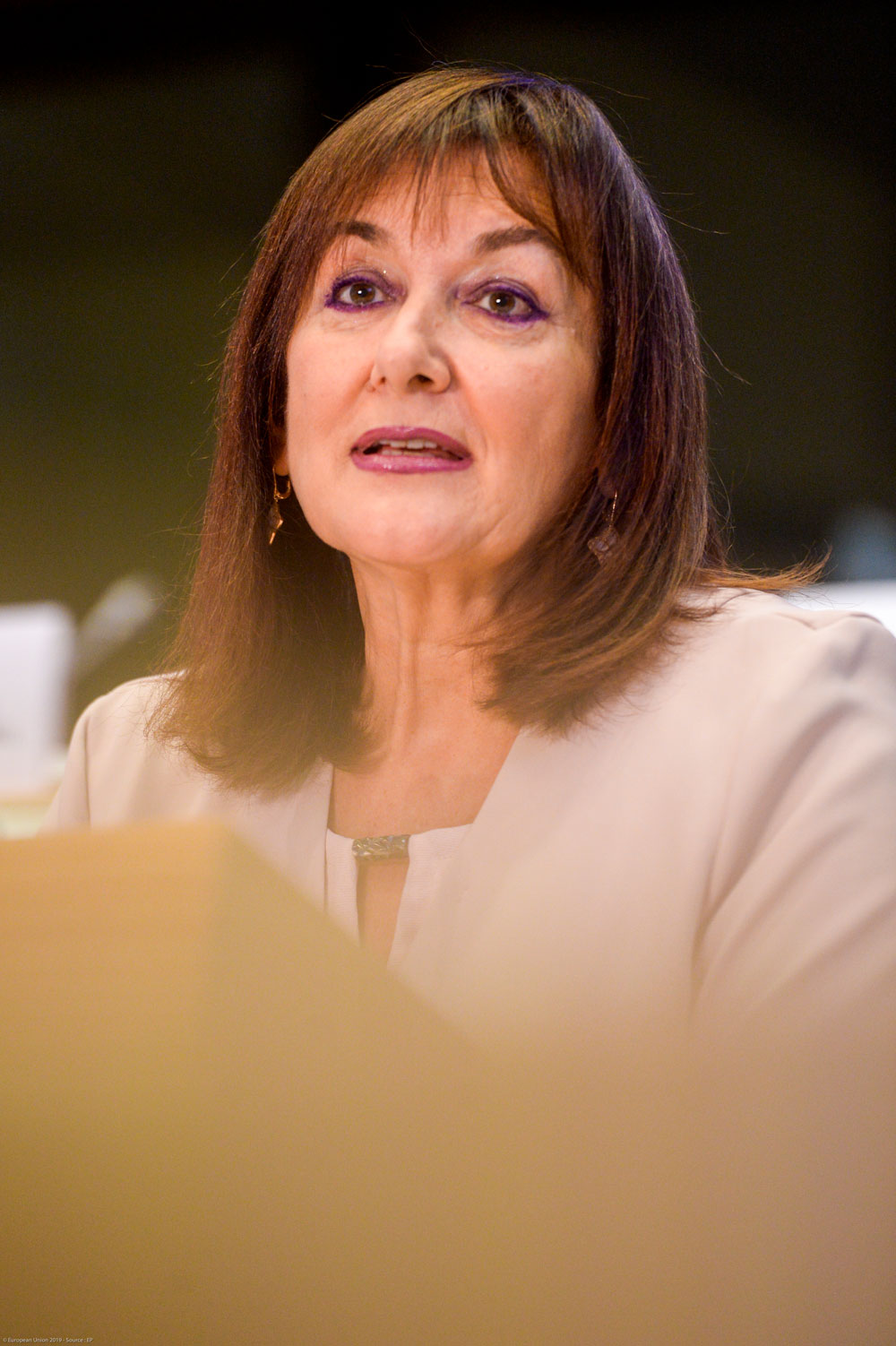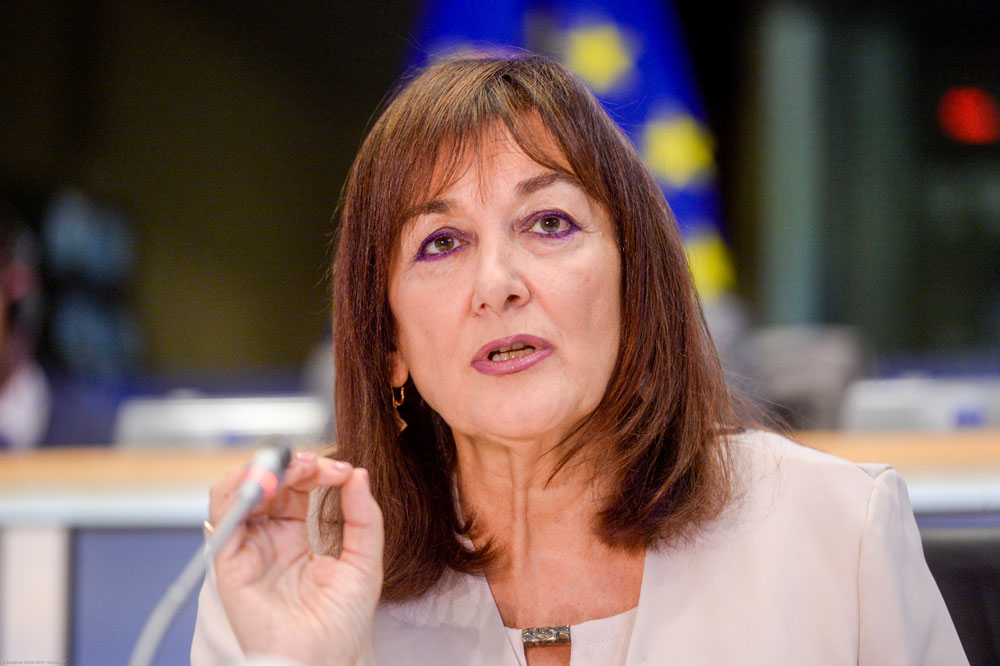ÁMBITO EUROPEO
DUBRAVKA SUICA,
vicepresidenta de la Comisión Europea para la Democracia y la Demografía
vice president of the european commission for democrazy and demography

Dubravka Suica (Luetic, Croacia, 1957) es una política del partido de centroderecha Unión Democrática Croata (HDZ), vicepresidenta de la Comisión Europea para la Democracia y la Demografía desde 2019. Anteriormente ya estaba en política europea como eurodiputada. Fue la primera alcaldesa de Dubrobvknik. Como vicepresidenta de la Comisión, lidera los trabajos sobre democracia deliberativa y la Conferencia sobre el Futuro de Europa, que concluyó recientemente. También está a cargo del mapeo estadístico del impacto del cambio demográfico y coordina la visión a largo plazo para las áreas rurales en Europa.
“El envejecimiento nos desafía como individuos y como sociedad”
 ¿Se van a implementar realmente las reformas solicitadas en la Conferencia sobre el Futuro de Europa aunque supongan un cambio en los tratados europeos?
¿Se van a implementar realmente las reformas solicitadas en la Conferencia sobre el Futuro de Europa aunque supongan un cambio en los tratados europeos?
Corresponde a cada institución cumplir con los resultados de la conferencia, pero el seguimiento es una responsabilidad compartida. Estamos dispuestos a desempeñar nuestro papel para convertir las propuestas en acciones concretas. Las primeras propuestas de la Comisión para responder al informe final serán anunciadas por la presidenta Von der Leyen en su discurso sobre el estado de la Unión en septiembre. Hay ejemplos recientes que demuestran que, incluso en medio de una pandemia mundial o una guerra, Europa puede cumplir en áreas que no están explícitamente previstas en los tratados. Hemos adquirido miles de millones de vacunas para los europeos y hemos trabajado para reactivar la economía a través de NextGenerationEU, por mencionar solo dos. Pero podríamos ir más lejos. Europa podría desempeñar un papel más importante, por ejemplo, en salud y defensa, y en algunas áreas clave donde la votación por unanimidad no tiene sentido y necesitamos poder avanzar más rápido. Tenemos que encontrar la forma más directa de dar seguimiento a las conclusiones de la conferencia, ya sea utilizando todos los límites de lo que se puede hacer dentro de los tratados, o si es necesario, cambiando los tratados.
Se ha argumentado que la Conferencia sobre el Futuro de Europa debería convertirse en un instrumento participativo permanente. ¿Cree que la CoFoe tuvo el éxito suficiente para hacerlo?
La Conferencia sobre el Futuro de Europa ha sido un ejercicio innovador de democracia deliberative, sostiene nuestra democracia representativa. Pero hay que recordar que en nuestra democracia representativa, los parlamentos son lugares de debate. La conferencia ha sido un ejercicio transnacional y multilingüe sin precedentes en democracia deliberativa. Los ciudadanos piden una mayor participación en la elaboración de políticas de la UE y, dados varios acontecimientos políticos, hemos reconocido que continuar como hasta ahora no es el camino a seguir. De hecho, a raíz de la pandemia y ahora que el horror de la guerra regresó a Europa, seguir como hasta ahora no es una opción.
Necesitamos una visión, una reinvención creativa de la democracia en la UE con el coraje de actuar de manera diferente y empoderar a los ciudadanos. No es suficiente que los ciudadanos esperen 4 o 5 años para expresar sus puntos de vista en las elecciones; quieren la oportunidad de contribuir con más regularidad.
“EL CAMBIO DEMOGRÁFICO PUEDE PERCIBIRSE COMO MENOS VISIBLE QUE LOS DESAFÍOS ASOCIADOS A LA TRANSICIÓN VERDE O DIGITAL, PERO NO ES MENOS URGENTE”
Entre sus competencias se encuentran las de recopilar información sobre los desafíos demográficos para establecer una hoja de ruta. ¿Está preparada Europa para el envejecimiento previsto de su población?
Mi trabajo trata sobre la vida de las personas a lo largo de todo su ciclo. Por ejemplo, parece que las diferencias de actitud hacia la UE pueden verse influidas por la edad y el lugar de residencia. Además, las actitudes políticas y el comportamiento electoral están determinados por los cambios en la estructura de edad de los territorios. Estamos pasando por tres transiciones. Las dos primeras son probablemente las más visibles: la verde y la digital. El cambio demográfico puede percibirse como más gradual y menos visible que algunos de los desafíos que enfrentamos asociados a esas dos transiciones, pero no es menos urgente. De hecho, sin incorporar la implicación de las transiciones demográficas en nuestros procesos, no podremos lograr lo que necesitamos para avanzar hacia una forma de vida más sostenible y una forma de vivir en un entorno cada vez más digital.
Ese es precisamente el propósito de mi cartera: garantizar que los Estados miembros y las instituciones europeas tengan la información y las herramientas adecuadas que necesitan para asegurarse de que están listos. El envejecimiento nos desafía como individuos y como sociedad. Por ejemplo, podemos esperar una demanda creciente en el cuidado a largo plazo. Otro factor es que la población en edad de trabajar se está reduciendo al mismo tiempo que aumenta el grupo de personas mayores. Esto ejerce presión sobre nuestros sistemas de protección social y desafía nuestros niveles de productividad y prosperidad. También debemos ser conscientes del peligro de la pobreza en la vejez.
“A RAÍZ DE LA PANDEMIA Y AHORA QUE EL HORROR DE LA GUERRA VOLVIÓ A EUROPA, SEGUIR COMO HASTA EL MOMENTO NO ES UNA OPCIÓN”
¿El movimiento de refugiados debido al conflicto en Ucrania cambia de alguna manera las tendencias demográficas proyectadas?
Todavía es demasiado pronto para evaluar completamente el impacto a largo plazo de la brutal guerra que libra el Kremlin en Ucrania. En el plazo inmediato, sin embargo, hemos estado trabajando para mapear la diáspora ucraniana en toda la UE, con el fin de ayudar en términos de planificación a dónde podrían ir aquellos que huyen de la guerra cuando buscan refugio en los Estados miembros. Estamos particularmente preocupados, y esto también entra dentro de mi cartera, por el bienestar de los niños que se han ido de Ucrania. Estamos haciendo esfuerzos para apoyar a nuestros Estados miembros para que puedan recibir adecuadamente a estos niños, brindarles alojamiento, alimentación, atención médica, apoyo psicosocial e integrarlos en sus sistemas educativos nacionales.
“ESTAMOS EN EL PROCESO DE ESTABLECER UN OBSERVATORIO RURAL Y DE ELABORAR UN MANUAL HECHO A MEDIDA PARA LAS ZONAS RURALES PARA UN MEJOR USO DE LOS FONDOS DE LA UE”
España es un ejemplo de disminución de la población en las zonas rurales. ¿Cómo se puede revertir esta tendencia y qué puede hacer la UE para contribuir?
Esta tendencia a la disminución de la población en las zonas rurales ha sido uno de los desencadenantes clave de nuestra comunicación sobre la visión a largo plazo para las zonas rurales. Lo presentamos en junio del año pasado y desde entonces estamos trabajando en sus resultados. Hace un par de semanas lanzamos el Pacto rural, que reúne a todas las partes interesadas para hacer que las zonas rurales sean más vibrantes, dinámicas y atractivas; a principios de este año, comenzamos a probar todas nuestras iniciativas políticas clave en zonas rurales, para asegurarnos de que también beneficien a nuestras áreas rurales. Ahora estamos en el proceso de establecer un observatorio rural y de elaborar un manual hecho a medida para las zonas rurales para un mejor uso de los fondos de la UE.
“NO BASTA CON QUE LOS CIUDADANOS ESPEREN 4 O 5 AÑOS PARA EXPRESAR SU OPINIÓN EN LAS ELECCIONES, QUIEREN LA OPORTUNIDAD DE CONTRIBUIR MÁS REGULARMENTE”
España es también otro de los países europeos que está experimentando una fuerte ‘fuga de cerebros’. ¿Qué está haciendo la Comisión y la UE en su conjunto para detenerlo o evitarlo?
Estamos preparando para fin de año una iniciativa sobre este tema específico. El fenómeno está afectando a varias regiones de la UE y, si no se gestiona, corre el riesgo de generar consecuencias económicas y sociales muy negativas debido a la emigración de poblaciones jóvenes, educadas y dinámicas. Nuestra ambición con esta comunicación es atraer y retener talentos en las regiones de la UE que enfrentan una disminución de la población y transformar la fuga de cerebros en grano de cerebros con la ayuda de nuestras diferentes políticas, pero principalmente a través de la cohesión. Queremos crear nuevos polos de atracción en torno a diferentes estrategias de especialización inteligente y convertir a las regiones de la UE en centros de vida saludable y nuevas oportunidades.
¿La situación geopolítica y macroeconómica actual podría poner a los gobiernos en riesgo de priorizar políticas sociales de largo plazo como la Garantía Juvenil o Infantil?
Está claro que nos encontramos en una coyuntura geopolítica crítica en este momento. Nuestras políticas internas y externas están entrelazadas, se afectan y se informan mutuamente. Sería negligente decir que esta crisis no tiene consecuencias de gran alcance también dentro de la UE. La implementación de la garantía infantil y juvenil está muy avanzada. Nos hemos fijado el objetivo de abordar de manera efectiva la pobreza infantil, sacar a los niños y sus familias de la pobreza. Esto sigue siendo una prioridad. La garantía está especialmente diseñada para ayudar a los niños necesitados, que también incluye a los niños en movimiento y, en adelante, a los que huyen de la guerra de agresión rusa contra Ucrania. Ahora juega un papel crucial. La crisis actual sin duda tendrá un impacto en nuestros sistemas sociales, razón de más para fortalecerlos. Son los cimientos de nuestras sociedades democráticas y si la realidad actual nos ha enseñado algo, es que ahora más que nunca necesitamos solidificar nuestros cimientos. Mientras hacemos nuestra tarea aquí en la UE, también predicamos con el ejemplo más allá de nuestras fronteras.
Sumarios.
Dubravka Suica (Luetic, Croatia, 1957) is a politician from the centre-right Croatian Democratic Union (HDZ), Vice-President of the European Commission for Democracy and Demography since 2019. Previously she was already in European Politics as member of the European Parliament from 2013 to 2019. She was the first female mayor of Dubrobvknik. As Vice-President of the Commission, she leads the work on deliberative democracy and the Conference of the Future of Europe, that concluded recently. She is also in charge of the statistical mapping of the impact of the demographic change and also coordinating the long-term vision for rural areas in Europe.
“Ageing challenges us both as individuals and as a society”.
Are the reforms requested in the Conference on the Future really going to be implemented even if they involve a change in the European treaties?
It is up to each institution to deliver on the follow-up of the Conference. Follow-up is nevertheless a shared responsibility. We are ready to play our part in turning proposals into concrete action. The first new Commission proposals responding to the final report will be announced by President von der Leyen in her State of the Union Address in September. Recent examples show that, even in the midst of a worldwide pandemic or a war, Europe is able to deliver on areas that are not explicitly foreseen in the Treaties. We have procured billions of vaccines for Europeans and worked on kick-starting the economy through NextGenerationEU to mention just two examples. Beyond this, we could go further. Europe could play a greater role for example in health and in defence, and in some key areas where unanimity voting does not make sense and we need to be able to move faster.
We have to find the most direct way to follow-up on the conclusions of the Conference, either by using the full limits of what can be done within the Treaties, or if needed changing the Treaties where necessary.
Some have argued that the Conference on the Future of Europe should become a permanent participatory instrument. Do you think the CoFoe was successful enough to become permanent?
The Conference on the Future of Europe has been an innovative exercise in deliberative democracy. It underpinned our representative democracy. But remember our representative democracy and parliaments are places for debate. The Conference has been an unprecedented transnational, multilingual exercise in deliberative democracy. Citizens are calling for a greater involvement in EU policy making, and given various political developments, we have acknowledged that business as usual is not the way forward for us at the institutions. Indeed, in the wake of the pandemic and now the horror of war returned to Europe, business as usual is not an option.
We need a vision, a creative re-imagining of democracy in the European Union with the courage to deliver differently and to empower citizens. It is not enough for citizens to wait 4 or 5 years to express their views in elections, they want the opportunity to contribute more regularly.
“DEMOGRAPHIC CHANGE MAY BE PERCEIVED AS LESS VISIBLE THAN THE CHALLENGES ASSOCIATED TO GREEN OR DIGITAL TRANSITION BUT IT IS NOT LESS URGENT”
Among your competences, there are those of collecting information on the demographic challenges to set a roadmap. Is Europe ready for the expected ageing of its population?
My work is about people’s lives throughout the whole life cycle. For example, it appears that differences in attitudes towards the EU may be influenced by age and place of residence. In addition, political attitudes and electoral behaviour are shaped by changes in the age structure of territories. We speak of undergoing three transitions at the moment. The first two are probably the most visible – the green and digital transitions. Demographic change may be perceived to be more gradual and less visible than some of the challenges we face associated with these transitions, but it is no less urgent. In fact, without incorporating the implication of demographic transitions into our processes, we will not be able to achieve what we need to in terms of moving towards a more sustainable way of living and a way of living successfully in an increasingly digital environment.
That is precisely the purpose of my portfolio – to ensure member states and the European institutions have the information and the appropriate tools that they need to ensure that they are ready. Ageing challenges us both as individuals and as a society. For example, we can expect an increasing demand in long-term care. Another factor is that the working-age population is shrinking while at the same time the group of older persons increases. This puts pressure on our social protection systems and it challenges our levels of productivity and prosperity. Likewise, we need to be aware of the danger of old-age poverty.
“IN THE WAKE OF THE PANDEMIC AND NOW THE HORROR OF WAR RETURNED TO EUROPE, BUSINESS AS USUAL IS NOT AN OPTION”
Does the refugee movement due to the conflict in Ukraine change in any way the projected demographic trends?
It is still too early to fully assess the long-term impact of the brutal war being waged by the Kremlin in Ukraine. In the immediate term, however, we have been working to map the Ukranian diaspora across the EU, in order to help in terms of planning where those fleeing the war could go as they seek refuge in member states.
We are particularly concerned – and this also falls within my portfolio – about the well-being of the children who have left Ukraine. We are taking efforts to support our Member States so that they can adequately receive these children, provide them with shelter, food, healthcare, psycho-social support and integrate them in their national education systems.
“WE’RE NOW IN THE PROCESS OF ESTABLISHING A RURAL OBSERVATORY, AND OF PUTTING TOGETHER A HANDBOOK TAILOR-MADE FOR RURAL AREAS FOR THE BETTER USE OF EU FUNDS”
Spain is one example of population decline in rural areas. How can this trend be reversed and what can the EU do to contribute?
This tendency of population decline in rural areas has been one of the key triggers for our communication on the long-term vision for rural areas. We have presented it in June last year, and we are ever since working on its very concrete deliverables. A couple of weeks ago we have launched the Rural pact – bringing together all stakeholders to make rural areas more vibrant, dynamic and attractive; earlier this year we have started rural proofing all our key policy initiatives, to make sure that they also benefit our rural areas. We’re now in the process of establishing a rural observatory, and of putting together a handbook tailor-made for rural areas for the better use of EU funds. This is how we are trying, to help reversing the trend, and to make our rural areas connected, prosperous and attractive!
“IT IS NOT ENOUGH FOR CITIZENS TO WAIT 4 OR 5 YEARS TO EXPRESS THEIR VIEWS IN ELECTIONS, THEY WANT THE OPPORTUNITY TO CONTRIBUTE MORE REGULARLY”
Spain is also another of the European countries that is experiencing a heavy ‘brain drain’. What is the Commission and the EU as a whole doing to stop or prevent it?
We are preparing for the end of the year an initiative on this specific topic. The phenomenon is affecting a number of EU regions and if left unmanaged risks generating very negative economic and social consequences because of the outflowing migration of young, educated and dynamic populations. Our ambition with this communication is to attract and retain talents in EU regions facing population decline, and to transform brain drain into brain grain with the help of our different policies, but mainly through cohesion. We want to create new poles of attraction around different smart specialisation strategies and make EU regions hubs of healthy living and new opportunities.
Could the current geopolitical and macroeconomic situation put governments at risk of prioritising long-term social policies such as the Youth or Child Guarantee?
It is clear that we are at a critical geopolitical juncture right now. Our internal and external policies are intertwined,

they affect and inform one another. It would be remiss to say that this crisis does not have far reaching consequences also inside the EU. The implementation of both the child and youth guarantee are well underway. We have set ourselves the goal to effectively tackle child poverty, lift children and their families out of poverty. This remains a priority. The guarantee is particularly designed to support children in need, which also includes children on the move, and henceforth those fleeing the Russian war of aggression against Ukraine. It plays a crucial role now. The current crisis will certainly have an impact on our social systems, which is all the more a reason to strengthen them. They are foundations for our democratic societies and if the current reality has taught us one this, is that we now need to solidify our foundations more than ever. While doing our homework here in the EU, we are also leading by example beyond our borders.




